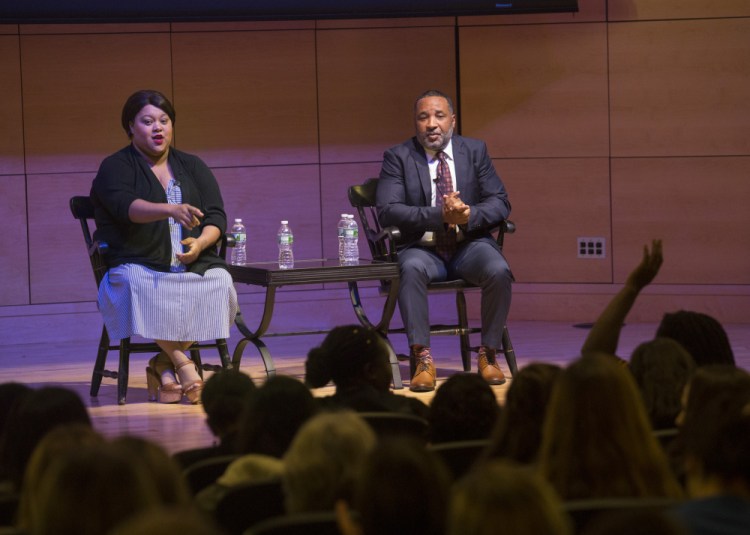Decades after doctors took Henrietta Lacks’ cancer cells without her knowledge, her heirs urged today’s nursing students to behave ethically in their work.
“You have to talk to people in a way they understand. If you don’t, you’re stealing their rights from them, you’re stealing their knowledge,” said Veronica Robinson, Lacks’ great-granddaughter. “Those are some of the things that were stolen from my great-grandmother.”
Lacks, a poor black tobacco farmer in Virginia, astonished doctors when her cancer cells, taken by doctors at Johns Hopkins in 1951, became a medical miracle. They were the first “immortal” cells – those capable of reproducing and dividing outside the body. Scientists had previously tried to cultivate cells that would reproduce but they had always died.
Unknown to her, the cells, renamed HeLa cells, were shipped all over the world and used to develop some of the most important medical advances in history: the polio vaccine, cancer treatments, cloning and in vitro fertilization, among innumerable other medical treatments.
Her family was never compensated, but Lacks’ identity was revealed in a scientific journal in 1971 in reference to the landmark accomplishment. Her story was subsequently told in a BBC documentary in 1997, and in the 2010 best-selling book, “The Immortal Life of Henrietta Lacks” by Rebecca Skloot, which spent 75 weeks on The New York Times paperback nonfiction best-seller list. The book was made into an HBO movie released earlier this year, starring Oprah Winfrey.
On Friday in Portland, Robinson and Alfred Carter Jr., Lacks’ grandson, spoke about the family’s legacy and medical ethics at Hannaford Hall at University of Southern Maine as part of the campus’ yearlong discussion on race and participatory democracy.
“There was an injustice done in 1951,” said Carter. “For years, her legacy was kept under wraps – they even attempted to change her name,” he said, referring to doctors saying the cells were taken from someone named “Helen Lane.”
“We all know it was done because of her race.”
Carter and Robinson urged nursing students not to repeat the mistakes and unethical behavior of the doctors who took Lacks’ cells without her permission or knowledge.
“Just remember when you start working with people, they are not subjects. They are mothers, grandmothers, aunts,” said Robinson, herself a nursing student at Baltimore City College. “Treat them the way you want (nurses) to treat your family.”
“Don’t look at your patients as a number. They’re people,” said Carter.
That was inspiring to hear for nursing student Dontavis Hines, 26, who also works as a clinical nursing assistant at Maine Medical Center.
“It motivated me,” said Hines, as he stood in line to get an autograph for his copy of “The Immortal Life of Henrietta Lacks.” “There are not a lot of people who look like me in the health care industry. There’s so much I want to do. It’s not just nursing, it’s ethics. That’s why we need to talk about it.”
Carter said he heard about his grandmother from family members growing up, but didn’t learn about her full medical legacy until the 1990s, when he was grown.
Today, he runs the Henrietta Lacks House of Healing, which provides housing and services for men coming out of incarceration. Roughly a dozen men spend six months to a year at the home, and Carter said it is in honor of Lacks’ well-known hospitality.
“My grandmother would let everyone come stay at her house,” he said. “It’s natural.”
Robinson is executive director of the Henrietta Lacks Legacy Foundation, which focuses on education surrounding vaccinations, she said. She is a Lacks Family representative on a panel for the National Institutes of Health responsible for reviewing applications for the use of HeLa cells in research.
“Normally people who look like me are a topic of discussion at the table, but now I sit at the table,” Robinson said, to applause from the crowd. “So they get a better understanding of where we’re coming from.”
Johns Hopkins never patented the HeLa cells, and didn’t sell or profit from their distribution. But some family members say they should be compensated by the hospital or pharmaceutical companies that used them to develop medical treatments.
Carter laughed Friday when asked about whether the family feels like compensation should be given.
“I feel like they should just give us a check,” he said, before continuing with a more altruistic response.
“Honestly, I think that the family was treated disrespectfully, but it’s people like you all that keep us pushing forward,” he said. “To find the good that came from the bad. It created a platform to be able to give back and help.”
Noel K. Gallagher can be contacted at 791-6387 or at:
Twitter: noelinmaine
Send questions/comments to the editors.




Success. Please wait for the page to reload. If the page does not reload within 5 seconds, please refresh the page.
Enter your email and password to access comments.
Hi, to comment on stories you must . This profile is in addition to your subscription and website login.
Already have a commenting profile? .
Invalid username/password.
Please check your email to confirm and complete your registration.
Only subscribers are eligible to post comments. Please subscribe or login first for digital access. Here’s why.
Use the form below to reset your password. When you've submitted your account email, we will send an email with a reset code.